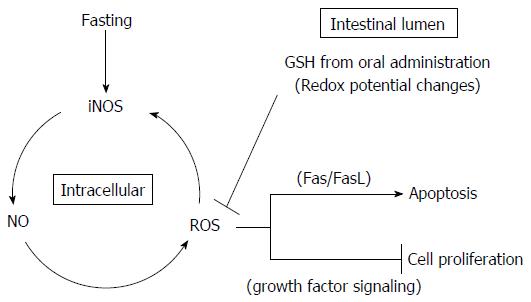Copyright
©The Author(s) 2017.
World J Gastroenterol. Sep 28, 2017; 23(36): 6650-6664
Published online Sep 28, 2017. doi: 10.3748/wjg.v23.i36.6650
Published online Sep 28, 2017. doi: 10.3748/wjg.v23.i36.6650
Figure 11 Schematic diagram of protective effects of glutathione in the intestinal lumen against fasting-induced intestinal atrophy, mediated through oxidative stress.
The schematic diagram depicts a possible role of intestinal lumen redox status in the regulation of jejunal mucosa apoptosis and cell proliferation in fasting-induced intestinal atrophy, mediated through oxidative stress. Fasting causes increased production of NO and ROS as apoptosis mediators following elevation of iNOS expression. The changes in apoptosis and cell proliferation in the intestinal mucosa resulting from oral GSH administration during fasting may derive from intracellular ROS removal by redox potential changes mediated by GSH and Cys (originating from enzymatic hydrolysis of GSH) in the intestinal lumen. Intracellular ROS removal is considered to inhibit Fas-mediated apoptosis and increase growth factor-mediated cell proliferation. GSH: Glutathione; ROS: Reactive oxygen species.
- Citation: Uchida H, Nakajima Y, Ohtake K, Ito J, Morita M, Kamimura A, Kobayashi J. Protective effects of oral glutathione on fasting-induced intestinal atrophy through oxidative stress. World J Gastroenterol 2017; 23(36): 6650-6664
- URL: https://www.wjgnet.com/1007-9327/full/v23/i36/6650.htm
- DOI: https://dx.doi.org/10.3748/wjg.v23.i36.6650









